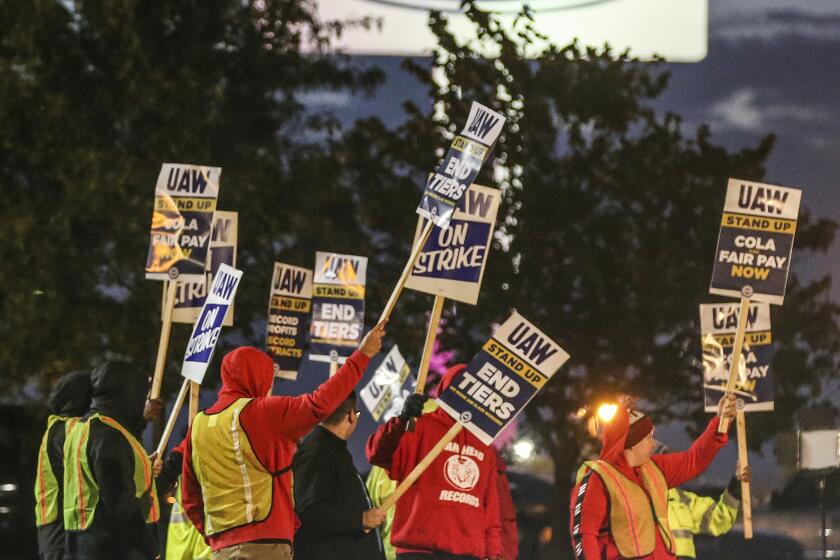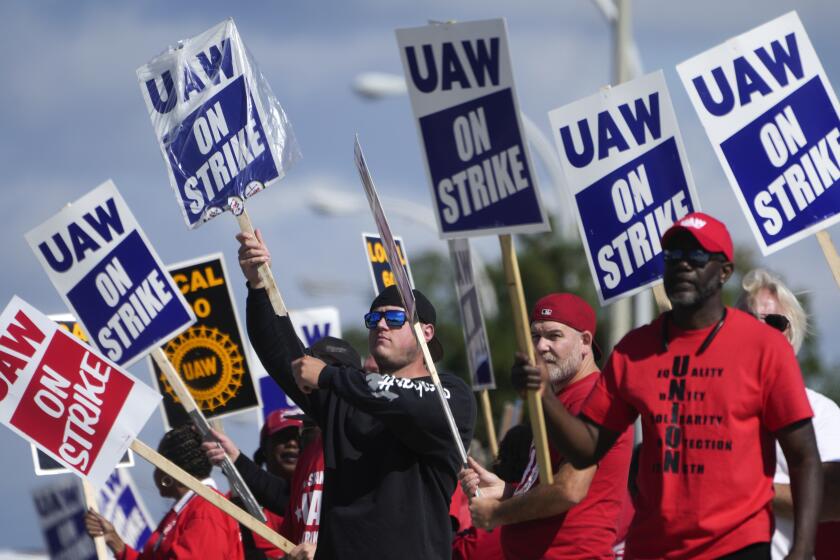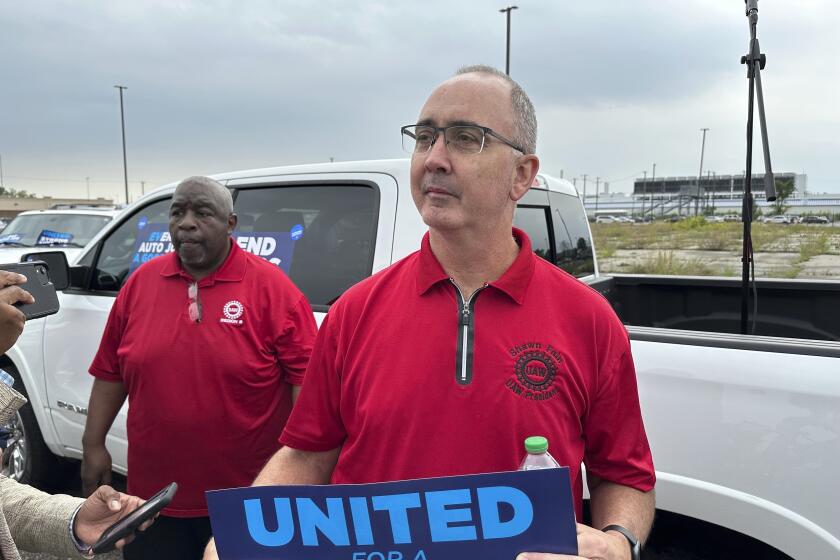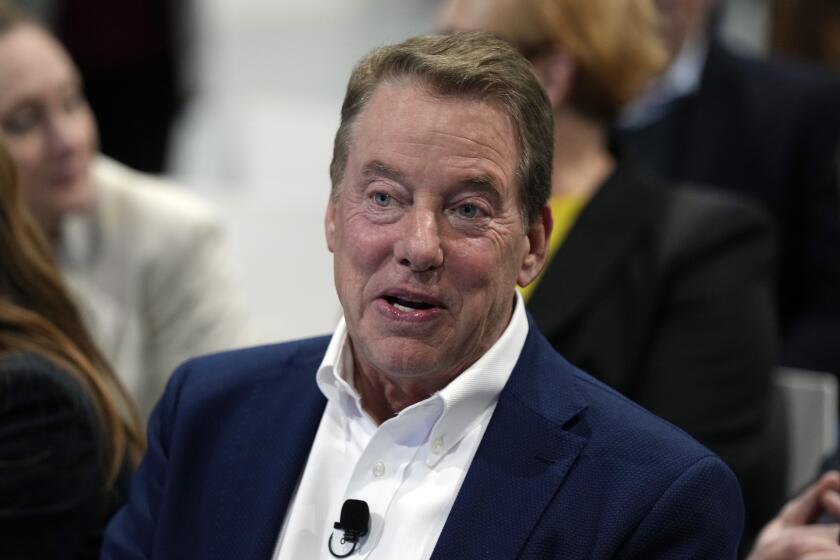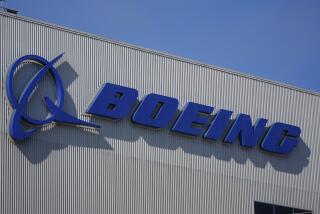Head of autoworkers union says strikes will continue in drive to gain better offers from companies

- Share via
United Auto Workers President Shawn Fain said Friday that although Detroit’s automakers have increased their wage and benefit offers, he believes the union can gain more if it holds out longer in contract talks.
In a Facebook Live appearance, Fain didn’t announce any more factories to add to those that have been on strike for up to five weeks. But he warned that the UAW could announce such an expansion of its strikes at any time, depending on how much progress it makes in its negotiations with the automakers.
In the last 24 hours, Fain said, Stellantis and GM have made wage offers that matched Ford’s 23% over the life of a four year contract. But, speaking in his characteristic sharp tones, the union president insisted that the companies can go further.
“We’ve got cards left to play, and they’ve got money left to spend,” he said.
Arguing that Ford “pretends they can’t afford what we’re asking for,” Fain noted that the company has complained about the union’s walkout at the Kentucky Truck Plant in Louisville, which has had to shut down. That plant is the largest and most profitable Ford factory in the world.
Though Fain said the UAW will make an aggressive push to secure better contract offers, he contended that the companies are trying to divide union members.
“They just want to wait us out,” he said. “They want to divide. They want fear, and they want uncertainty. What we have is solidarity.”
Although the companies contend they have made record offers to the UAW, Fain said they are insufficient to make up for how much ground workers have lost during the last two decades. Every time the automakers make an offer, Fain said, they insist it’s the best they can do, only to return days later with a better offer.
“What that should tell you,” Fain said, is that “there’s room to move.”
In a statement, GM said it made an offer Friday with “substantial movement in all key areas in an effort to reach a final agreement with the UAW and get our people back to work.”
The company says the offer raises pay for most of the workforce to $40.39 an hour, or about $84,000 annually by the end of a four-year contract. That’s a 23% increase over the $32.32 an hour that most factory workers make. Compounded annually it’s 25%.
The company also said it reinstated cost-of-living raises for many employees that were given up in 2007, boosting the pay increase to more than 30% by September 2027. It previously had offered to contribute 8% of a worker’s salary to 401(k) defined contribution plans.
“It is time for us to finish this process, get our team members back to work and get on with the business of making GM the company that will win and provide great jobs in the U.S. for our people for decades to come,” GM said in its statement.
The United Auto Workers union escalated its walkout against Detroit’s Big Three automakers by going on strike at the largest and most profitable Ford plant.
The UAW had been seeking 36% in raises over four years.
It’s not clear just when Fain may call on more workers to strike and join the 34,000 already off the job at six vehicle assembly plants and 38 parts distribution warehouses.
The money automakers spent on stock buybacks to raise shareholder profits, rather than on wages or investments in a green future, helps explain why workers are stepping up the pressure.
Marick Masters, a business professor at Wayne State University in Detroit, said in order for the UAW to settle with all three carmakers, Ford and Stellantis will have to join GM in agreeing to include future electric vehicle battery factories in the UAW national agreement. That would essentially ensure that the factories of the future would be represented by the union, a key point for the union.
The union’s strikes at targeted plants at each company began Sept. 15 and are nearing the start of their sixth week.
GM was to meet with the union Friday. There also were meetings Thursday with Jeep maker Stellantis.
On Thursday, GM posted a video indicating that bargainers are still some distance apart. “You might be asking yourselves why can’t General Motors meet every demand Shawn Fain is asking for?” Manufacturing chief Gerald Johnson said on the video. “Simple answer is we need profits to invest in our future.”
At the time of the video, GM’s top wage offer was $39.24 an hour by September 2027.
As usual, the media and politicians are blaming the possibility of an auto strike on the auto workers union, but company managements are the guilty parties.
The UAW also is seeking restoration of defined benefit pensions that workers gave up in the Great Recession, pension increases for retirees, an end to varying tiers of wages for workers and other items. GM’s offer appears to end the tiers in the last year of the new contract.
Johnson went on to say that during the last decade, GM had net income of $65 billion but invested $77 billion in the business. “If we don’t have those profits to continue our investments in our plants, our people and our products, we will be facing declining market share, an inability to fund the EV transition, and an inability to compete with a growing number of competitors right here in America,” Johnson said.
Ford and Stellantis have made similar comments, with Ford saying it has reached the limit on how much it can spend to settle the strike.
The union, however, says labor expenses are only about 5% of a vehicle’s costs, and the companies can divert money from profits and stock buybacks to pay for raises that cover inflation and make up for years of contracts without significant increases.
The strikes started with one assembly plant from each company after contracts expired at 11:59 p.m. Sept. 14. The union later added the parts warehouses, then one assembly plant each from Ford and GM.
Ford Executive Chair Bill Ford calls on autoworkers to end strike, says company’s future is at stake
Ford Motor Co.’s Bill Ford called on autoworkers to unite and end a strike that he says could cost the company the ability to invest in the future.
Last week the union made a surprise move, escalating the strikes by adding a huge Ford pickup truck and SUV plant in Louisville, Ky.
Fain told workers Friday that the union added the Kentucky plant after Ford presented an economic offer with no more money than a proposal from two weeks ago.
About 23% of the union’s 146,000 members employed by the three automakers are on strike.
Stellantis said Friday that it canceled displays and presentations at the upcoming Specialty Equipment Market Assn. show and the Los Angeles Auto Show as strike costs continue to grow. Earlier this week the company pulled out of the CES gadget show in January.
More to Read
Inside the business of entertainment
The Wide Shot brings you news, analysis and insights on everything from streaming wars to production — and what it all means for the future.
You may occasionally receive promotional content from the Los Angeles Times.
